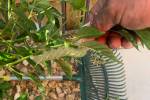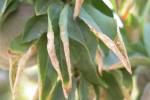Smoky blue lawn shows need for water
Lawn questions seem to be on people’s minds along with some other questions.
Q: Why is my lawn turning smoky blue?
A: It needs water. Another indication of dryness is walking across the lawn; if your footprints remain visible in the turf, irrigate. For a quicker rewetting of the soil, place a tablespoon of detergent in a gallon of water and drench the area and then give your lawn a thorough watering.
Check your sprinklers to see if they are covering the area properly. Sprinklers work on the buddy system. Translated, no sprinkler head waters its own territory. It relies on sprinklers next to it to water its area.
Q: This spring my Bermuda lawn was slow greening up and it’s still not lush?
A: For quicker greening up, apply nitrogen to your lawn next fall. Fall feedings increase the plant’s food reserves for an earlier green up next spring. To really put green into your lawn, do as the golf courses do, apply iron. Iron fertilizers may stain your sidewalks, so keep it off them.
Q: We are toying with the idea of installing artificial turf.
A: You must answer this question for yourself. I will say artificial turf manufactures have come a long way in improving its quality. It does get hotter than natural turf, but it conserves water.
Q: How can I get rid of cockroaches in my compost pile? I turn the pile and water it every day. I am adverse to chemicals.
A: You are overwatering and turning your compost pile too much. The excess moisture excludes the essential air for composting to work. Reach in the pile to see if it is moist; if so check later.
Also, here’s when cockroaches are beneficial! They are helping in the composting process. They have no desire to enter your home and if they do, it’s for only a short time.
Q: What are the black and yellow stripped worms eating everything but the veins on our grape leaves?
A: They are grape leaf skeletonizers and are easy to control. Use Bt (Bacillus thuringiensis), a biological controlled product available at all nurseries. The bugs must ingest this product to control them.
Q: Why do my rose bush leaves have a mosaic pattern on them? I feed it, but it’s not correcting the problem.
A: It has a mosaic virus. It doesn’t hurt the bush and there’s nothing you can do about it except remove it. Just enjoy another version of variegated leaves.
Q: Can we grow jojoba beans here? I understand they produce oil similar to whale oil.
A: Yes they grow here and do produce whalelike oil. We use it more as a bush. It’s a slow-growing, irregular-shaped shrub getting 6 feet tall and as wide. To get beans, you must have female and male plants. Indians and white settlers used jojoba beans as a coffee substitute and ate the nuts raw or roasted, but the tannic acid content limited their popularity.
Q: Can we grow sugar bush here? I can’t find it at the nurseries?
A: Sugar bush is hard to propagate. I love its crisp, leathery and deep green leaves. Its attractive red stems support leaves and red buds that will open into small creamy flowers next spring that taste like sugar.
Both the jojoba bean and sugar bush are “forget-about-me” bushes, requiring very little pruning and water. The Springs Preserve has several in its garden.
Q: Why are my grapes all dropping off?
A: It’s known as fruit blasting brought on by exposure to wind. The developing grapes dehydrate and drop from the clusters. If it’s a perennial problem, consider protecting them. Give your plants a deep irrigation weekly. Blasting isn’t all that bad; you’ll get larger grapes because it is thinning them out.
Q: My peppers grew to a point and I’m wondering why they are sizing up?
A: Strip all the fruits now on the plant off. The bush seems to respond by setting on bushels of peppers.
Q: Why are the bottom leaves on my desert spoon cactus dying?
A: It’s stressing for water. Check the emitters to see if they are working and if not, fix them. Follow with a deep soaking. Avoid using fertilizers until new growth emerges. Groom it by removing damaged leaves making cuts close to the trunk.
Linn Mills writes a garden column each Sunday. You can reach him at linnmillslv@gmail.com or call him at 526-1495.























